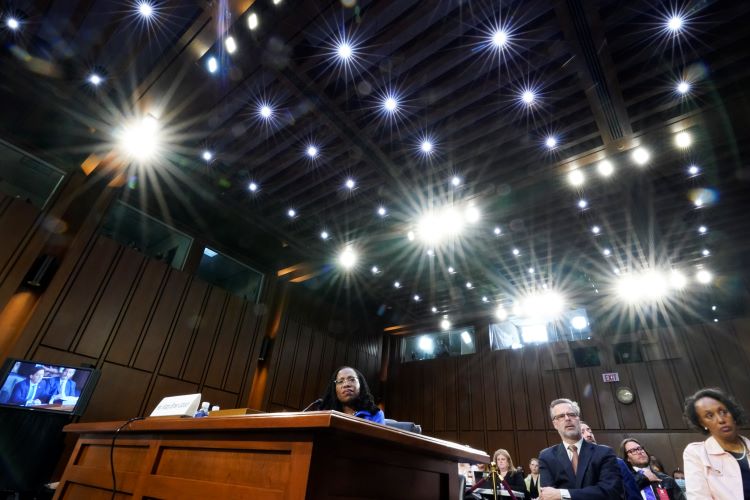Teen sentenced to 3 months by SCOTUS nominee Jackson felt 'confusion and shock' from images, his lawyer says

U.S. Supreme Court nominee Judge Ketanji Brown Jackson testifies during her Senate Judiciary Committee confirmation hearing on Capitol Hill on Wednesday. Photo by Alex Brandon/The Associated Press.
Many Republican members of the Senate Judiciary Committee have focused their attention on a three-month sentence that U.S. Supreme Court nominee Judge Ketanji Brown Jackson imposed on a youth in a child pornography case.
During Jackson’s confirmation hearing, GOP senators have portrayed her as being soft on crime, particularly in her below-guidelines sentencing in seven child pornography cases.
The lowest sentence of the seven was in the case of Wesley Hawkins. He was 18 years old when he downloaded scores of videos and images containing child pornography in 2012, the New York Times reports.
The prosecutor in the case had recommended a two-year sentence, the U.S. Probation Office had recommended an 18-month sentence, and the U.S. sentencing guidelines had recommended a sentence of 97 to 121 months in prison. The defense lawyer sought a day in prison.
Hawkins pleaded guilty to downloading and trading child pornography, and Jackson sentenced him in November 2013, according to the New York Times. Jackson sentenced Hawkins to three months in prison and six years of supervised release.
According to a statement of offense to which Hawkins stipulated, he downloaded and shared videos and images of prepubescent children to YouTube and a file-sharing account.
In a sentencing memorandum, Hawkins’ public defender said his client initially reacted to the images that he saw with “confusion and shock rather than arousal.” He viewed more child pornography over the next several months, but he “did not amass a large collection,” the memo said.
“Importantly, Mr. Hawkins’ connection to the images he viewed appears to be one of identifying with his age-mates emotionally, instead of exploiting them sexually. Mr. Hawkins said he found the fellow teenagers in the photos easier to connect with than adults,” the memo said.
Read our coverage of Judge Ketanji Brown Jackson’s U.S. Supreme Court nomination hearing here.
Hawkins was more drawn to images of individuals between ages 12 and 18, the sentencing memo said, and that is what images taken from a search of his computer reflect.
“This case does not involve images of infants or toddlers, as the vast majority of child pornography cases do. Mr. Hawkins did not pay for the images or trade other images for them,” the memo said. Nor did Hawkins respond to an undercover officer’s offer of real-time sexual activity with his fictitious 12-year-old daughter, the memo said.
A psychological assessment found that Hawkins “is a fundamentally good kid who has insecurity issues regarding his weight and social acceptance,” the sentencing memo said. He had expressed an interest in other men but said his mother strongly “disapproves of homosexual activity due to her religious beliefs.”
The defense argued that Hawkins deserved no more than a day in prison because he was young at the time of the offense, he had an “utter lack of dangerousness” and his therapeutic needs would be best met in the community. Hawkins “is deeply ashamed and remorseful for his actions,” the memo said.
In a letter to the judge, Hawkins said he disappointed everyone in his family and everyone who ever cared about him.
“I hope that I can make up my mistakes and that this will not end my life before it starts,” Hawkins wrote.
In imposing the sentence, Jackson acknowledged the defense claim that Hawkins should not be considered a pedophile because his age was close to that of the children depicted in the images, according to the New York Times. She said his crime was “serious” and “heinous,” but she did not think that he was “similar in intent or as culpable as some of the depraved older adults.”
She also told Hawkins that the children forced to commit “unspeakable acts” in the videos may never have normal adult relationships and could engage in destructive behaviors to deal with their emotional pain.
According to the New York Times, Jackson’s “relatively lenient sentence was not unusual for child pornography cases—especially for those of defendants who possess such material but are not involved in making it. Nor was the decision out of keeping with comparable cases in the federal district court in Washington, where older defendants with larger child pornography collections have not served prison time at all.”



